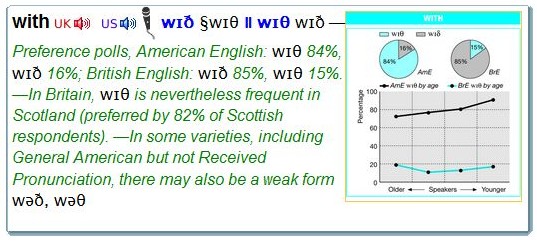The phonemic, i.e. prototypical, pronunciation of the word with in British Received Pronunciation is /wɪð/, with a voiced /ð/, as in the.
However, in contexts like "with people", with may be pronounced with a voiceless [θ], as in think, even in RP. This is because the word people starts with a voiceless consonant, /p/. Unless followed by a voiced sound such as a vowel, the voiced obstruent phonemes of English /b, d, ɡ, dʒ, v, ð, z, ʒ/ at the end of syllables are partially or wholly voiceless, which are then distinguished from the voiceless phonemes /p, t, k, tʃ, f, θ, s, ʃ/ only by when the preceding vowel ends. (See this blog post and the answers to The pronunciation of ending "s" and Are "whores" and "horse" homophones?.)
So if you want to speak RP, it wouldn't be incorrect to use a voiceless [θ] in with before words which start with a voiceless consonant, like people. Strictly speaking, since it ends phonemically with /ð/, the vowel /ɪ/ in with must be slightly longer than that in e.g. myth, which ends in a voiceless /θ/, but since with is a function word, which is most often unstressed and pronounced very quickly anyway, the distinction in vowels is most likely irrelevant in this particular case.
Meanwhile, many American and Scottish speakers pronounce with consistently with a voiceless /θ/, even when followed by a voiced sound. From Longman Pronunciation Dictionary by John Wells (source):


